New Online Nursing Course Has Global Impact
In June 2013, the World Health Organization released new guidelines for treating and preventing HIV in middle-and low-income countries. Option B+, the new recommendation for the prevention of mother-to-child transmission of HIV (PMTCT), calls for all pregnant and breastfeeding HIV Positive women to initiate lifelong HIV treatment.
In an effort to help train as many health workers in Option B+ as possible, ICAP—lead by Director and University Professor Wafaa El-Sadr—collaborated with CCNMTL to create an e-learning course on Option B+ targeting nursing faculty and students in sub-Saharan Africa. Option B+ is the flagship course inside the new ICAP Nursing E-learning platform. Free and open to the public, it was developed with support from the U.S. President’s Emergency Plan for AIDS Relief (PEPFAR).
Since ICAP’s announcement of the new course in October, interest in the Option B+ course has mushroomed. As of the start of the year, we’ve seen users of the course in 43 countries, both inside and outside sub-Saharan Africa. Users from around the world have been sending in requests to join the program, as well as notes of thanks for providing the material.
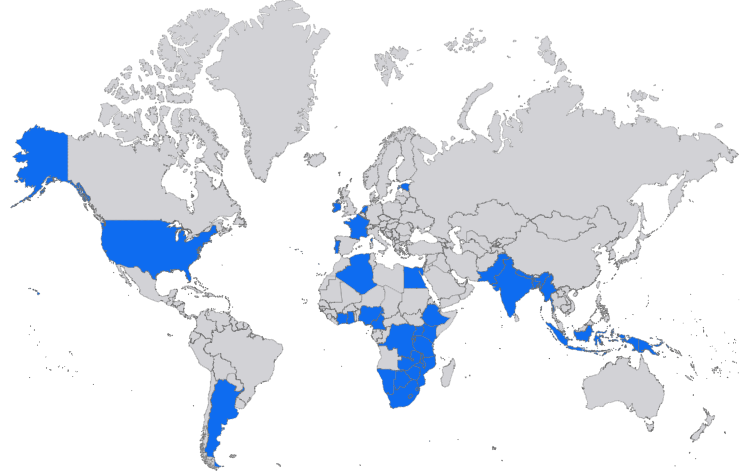
Why is the demand for this course so great? Many countries have implemented in-service (i.e. post-graduate) workshop trainings to teach existing professionals the new standards. However, these programs are expensive and can be plagued with low attendance because the demand for nurses and midwives is so great that health workers must remain in clinics providing care. Additionally, in-service trainings do not include faculty or students at nursing schools, the very people who will be forming the front line of health professionals in the coming years. For example, Malawi has been providing national in-service trainings including Option B+ since 2010, yet faculty at nursing schools including Mzuzu and Malawi College of Health Sciences said that they had not had the opportunity to be trained on Option B+. They downloaded the national guidelines, but hadn’t yet incorporated them into the undergraduate curriculum.
“E-learning has the potential to enhance undergraduate nursing education and to make continuing education more convenient by reducing absenteeism associated with in-service training workshops, so that nurses can remain at the front lines providing care,” says Janel Smith, nursing education officer at ICAP. The faculty and student focus of the course also addresses the current gap between nursing education and in-service trainings.
ICAP is currently piloting the new e-learning course at ten nursing schools in Malawi, Lesotho, and Zambia and will be evaluating faculty and student response to the course in February. ICAP has also promoted the course for continuing education among practicing nurses and midwives in sub-Saharan Africa through the East, Central, and Southern Africa Colleges of Nursing (ECSACON) Continuing Professional Development Library which provides a certificate for download. In addition, ICAP and CCNMTL expect to see continued uptake of the course in many countries outside Africa.
ICAP and CCNMTL Launch Nursing E-Learning Platform
This month ICAP and the Columbia Center for New Media Teaching and Learning (CCNMTL) launched the ICAP Nursing E-learning platform to support online learning for nurses and midwives, and to enhance classroom learning at nursing education institutions. The first material available is a self-paced course for nursing students attending schools throughout Africa.
This flagship course puts into context the World Health Organization’s (WHO) new recommendations on preventing mother-to-child transmission of HIV (PMTCT). WHO now recommends initiating lifelong antiretroviral treatment (ART) for pregnant and breastfeeding women who test positive for HIV. This new recommendation is called Option B+. The course provides case studies, interactive activities, and an exam that cover the most efficient and effective protocols surrounding the recommendation including how to counsel, antiretroviral (ARV) dosing for infants, supporting ART adherence for adults, and monitoring retention in care.
Having more nurses and midwives entering the workforce with training in Option B+ will accelerate and improve global efforts to eliminate mother-to-child transmission of HIV. Institutions working with ICAP can create groups of students within the e-learning system and monitor their progress as a component of coursework for a class. Other interested students and nurses from non-affiliated countries can use the system independently to work through the material. Requests from interested health workers outside Africa, from Brazil to Myanmar, are already coming in, showing the impact this course may have on eliminating mother-to-child transmission of HIV worldwide.
ICAP is based at Columbia University and is a global leader in HIV/AIDS and health systems strengthening. Capacity building for nursing and midwifery is an essential part of ICAP’s mission to ensure the health of families and communities around the world. CCNMTL is proud to be a partner with ICAP in offering this groundbreaking course, and supporting the mission to reduce HIV infection globally.
About CCNMTL
Columbia University’s Center for New Media Teaching and Learning (CCNMTL) builds education experiences for the University’s faculty, staff, and students on campus and online across all of Columbia’s colleges, schools, and departments. From our earliest days in 1999, CCNMTL has been dedicated to developing and producing quality new media and educational technology to enhance university teaching and learning. Our productions, publications, and events aim to provide thought leadership and practical support — and promote innovation in pedagogy and curriculum development — for teachers and education everywhere. CCNMTL is part of the Columbia University Libraries/Information Services.
New Website Provides Online Training for Doctors Caring for People With HIV
Doctors and nurses in New York and New Jersey will have a new way to learn about the latest hepatitis C treatments thanks to learn.nynjaetc.org, a new collaboration between the New York/New Jersey AIDS Education and Training Center (NYNJ AETC) and the Columbia Center for New Media Teaching and Learning (CCNMTL).
Learn.nynjaetc is an interactive, online extension of NYNJ AETC's in-person trainings and online publications. NYNJ AETC is a program funded by the U.S. Department of Health and Human Services Health Resources and Services Administration devoted to improving services and care for HIV positive people through education and training for health professionals. Learn.nynjaetc provides another channel of access to training and and information for health workers seeking to improve their skills and obtain continuing medical education credits.
Hepatitis C (HCV) is a world-wide public health problem, the cause of cirrhosis and liver cancer, and the leading cause of liver transplantation. Until recently, treatments for HCV resulted in sustained suppression of the virus for only 50% of patients with the type of HCV most common in North America and Europe. In 2011, two new drugs, both direct-acting antivirals, were approved. These drugs are significantly more effective, but they are also complicated to prescribe, and patients must be carefully monitored for side effects. As the landscape of HCV treatments changes and progresses, health care providers must carefully consider which patients to treat immediately, which to wait to treat, and how to treat HCV in patients also infected with HIV.
Helping doctors stay up-to-date on the newest and best treatments for health conditions relevant to people living with HIV is part of NYNJ AETC's core mission. So last year, Dr. Daria Boccher-Lattimore, Director of NYNJ AETC and a professor at Columbia University's Mailman School of Public Health, approached CCNMTL about collaborating on a self-paced online course that would teach doctors and other health professionals how to manage new hepatitis C treatments for patients with and without HIV. Dr. Boccher-Lattimore brought in Dr. Kristen Marks of Weill Cornell Physicians Organization, an expert in hepatitis C/HIV coinfection, to develop the course content.
Together, Dr. Boccher-Lattimore, Dr. Marks, and CCNMTL's team of designers and programmers developed innovative materials to teach response-guided treatment principles for HCV. The new course, "Hepatitis C Medications and Special Considerations for People Living with HIV," guides doctors through two patient cases and provides a detailed interactive activity that reveals differing treatment paths and end points depending on test results. Doctors can receive continuing medical education credits for the course through Weill Cornell, but the course itself is free and open to anyone who wants to learn more about HCV treatment.
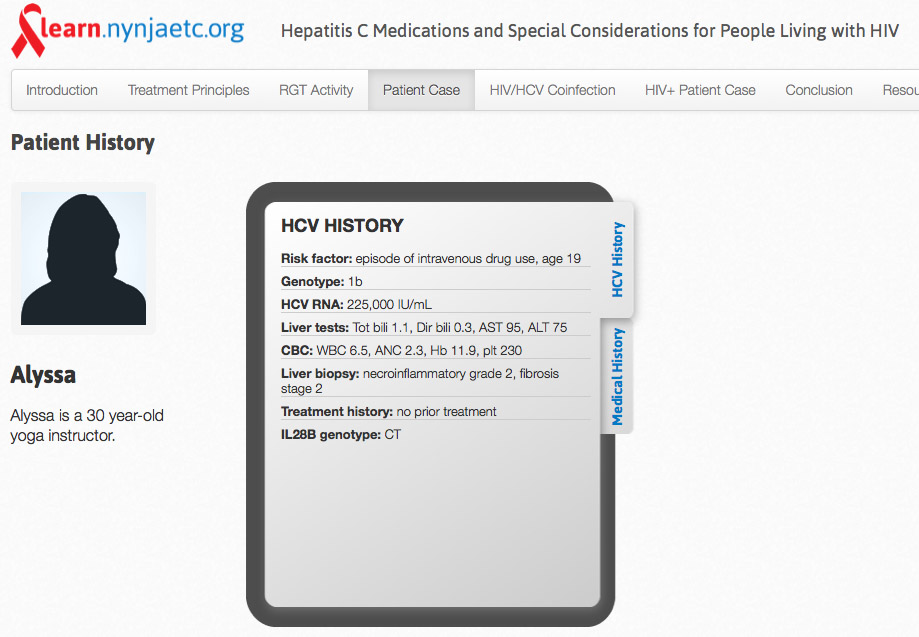
Inspired by their success collaborating on the Hepatitis C course, the project team decided to create learn.nynjaetc.org. The website provides access to the hepatitis C course and will also hold future online courses related to new treatments and best practices for the care of people living with HIV.
South Africa Trip Informs HIV Adherence Project
Staff from the Columbia Center for New Media Teaching and Learning (CCNMTL) and a research partner from the HIV Center for Clinical and Behavioral Studies recently traveled to South Africa to conduct on-site research for a digital counselor support tool designed to help HIV patients stay on their antiretroviral medication.
The tool is part of a project called Masivukeni, which translates to “Let's wake up!” in the Xhosa language. The HIV Center, CCNMTL, and the University of Cape Town recently received a $3 million NIMH grant to test whether patients who receive counseling through Masivukeni stay with their treatment plans better than those receiving standard counseling practices. Dr. Robert H. Remien, Professor of Clinical Psychology, is the principal investigator of the grant.
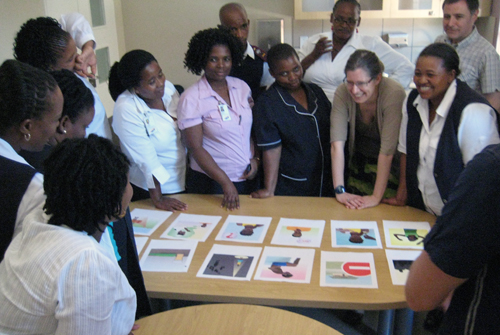
CCNMTL senior program specialist Jessica Rowe, CCNMTL web designer Marc Raymond, and Dr. Reuben Robbins from the HIV Center worked with Dr. Kevin Stoloff of the University of Cape Town and counselors and nurses hired for the Masivukeni project. They visited two clinics outside Cape Town where the Masivukeni trial will take place. Focus groups tested the tools and gave feedback on how the content and design, from navigation to illustrations, can best connect with Masivukeni’s target audience.
A major reward of the 7,800 mile trip from New York City was learning how to design a program that fits into the culture and everyday experiences of South African HIV patients. “There are some things you can’t Google,” said Raymond. “For Masivukeni to fit into the rest of the media world of our South African participants, it has to feel familiar, which is a challenge for American designers.”
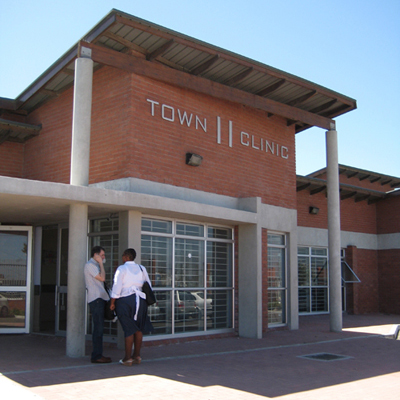
Rowe stressed the importance of working directly with South African counselors and being present to get candid, detailed feedback. “It was great to hear responses to the tool in person," she said. "We wouldn’t have been able to receive the same response from the counselors remotely.”
The trip is CCNMTL’s second to the country; the first was in 2008, when a research team gathered information to build a pilot version of Masivukeni.
Since their return, Raymond and Rowe have begun work on design improvements, and the project counselors have worked with Dr. Stoloff and the Columbia team to rewrite a voice-over for the program. A joint team from CCNMTL and the HIV Center will travel to South Africa again in May to deploy the tool at the test clinics and train counselors.
NIMH Awards New Grant to Extend Masivukeni Project
The HIV Center for Clinical and Behavioral Studies, the University of Cape Town and the Columbia Center for New Media Teaching & Learning have received a $3 million grant from the National Institute of Mental Health (NIMH) to refine and test Masivukeni, a computer-supported HIV treatment adherence intervention for patients in South Africa. This five-year grant, led by Dr. Robert Remien, builds on a 2007 grant from the NIMH that facilitated the development and piloting of Masivukeni with assistance from scientists, healthcare providers, and governmental partners in Cape Town. This pilot received overwhelmingly positive feedback.
Masivukeni, which translates to 'Let's wake up!' in the Xhosa language, is a standardized curriculum of information, skills development, and motivational activities designed to help patients in South Africa stay on their antiretroviral medication. Masivukeni provides lay counselors with an intervention roadmap and scripts that help them communicate to their patients the importance of adherence to treatment plans with a standardized approach. In addition, the Masivukeni tool features interactive activities to help patients build their support network, develop problem-solving skills, visualize their pill regimen, and learn how HIV affects the body as viral resistance develops.
The planned update of Masivukeni will launch in two Cape Town clinics in 2012 as part of a randomized control trial intended to test whether patients who receive counseling with Masivukeni stay with their treatment plans better than those receiving standard counseling practices.
CCNMTL will receive approximately $500,000 of the funds to enhance the intervention and support its use throughout the study. "It's exciting to have the opportunity to expand on our successful pilot for a study that will reach many more patients in need," said Ryan Kelsey, CCNMTL's associate director of education and research and a co-investigator on this grant. "The HIV Center staff has been amazing collaborators, allowing CCNMTL to demonstrate its capabilities as a key participant in university-based international research and education endeavors."
About CCNMTL
The Columbia Center for New Media Teaching and Learning (CCNMTL) was founded at Columbia University in 1999 to enhance teaching and learning through the purposeful use of technology and new media. In partnership with faculty, the Center supports efforts ranging from basic course website management to advanced project development. CCNMTL also extends the scope and reach of its work with strategic initiatives that engage educators, researchers, librarians, partner institutions, and the community in the reinvention of education for the digital age. For more information, please visit http://ccnmtl.columbia.edu.
Grant Received to Develop Technology to Abate Intimate Partner Violence
The Social Intervention Group (SIG) of the Columbia School of Social Work and the Columbia Center for New Media Teaching and Learning (CCNMTL) have received a $659,000 grant from the National Institute on Drug Addiction (NIDA) to develop and test a computer screening tool to identify and abate intimate partner violence (IPV). This project, known as WINGS, is led by Dr. Louisa Gilbert at SIG. WINGS will be tested in drug-court waiting rooms beginning in February 2012. CCNMTL will receive $125,000 of the grant over two years ending July 2013.
Women Initiating New Goals for Safety (WINGS), is a self-paced suite of computer activities that screen for IPV, help participants develop a safety plan and set goals, and introduce them to available social services that meet their individual needs. Based on research conducted in emergency rooms that shows that women are more likely to disclose IPV in the anonymous setting provided by a computer, the WINGS study will test whether more at-risk women can be reached through a computerized intervention rather than through a standard case-worker interview. Portions of WINGS are based on elements of the SIG and CCNMTL collaboration Women on the Road to Health (WORTH). Both WINGS and WORTH are projects in CCNMTL's Triangle Initiative, which seeks to develop work that furthers faculty research and classroom learning, and benefits communities outside the university.
"This terrific opportunity, which builds on a previous collaboration with SIG, provides evidence supporting CCNMTL's theory that new media tools built for one research project can be re-purposed and re-assembled for newly emerging contexts," said Frank Moretti, CCNMTL's executive director.
About CCNMTL:
The Columbia Center for New Media Teaching and Learning (CCNMTL) was founded at Columbia University in 1999 to enhance teaching and learning through the purposeful use of technology and new media. In partnership with faculty, the Center supports efforts ranging from basic course website management to advanced project development. CCNMTL also extends the scope and reach of its work with strategic initiatives that engage educators, researchers, librarians, partner institutions, and the community in the reinvention of education for the digital age. For more information, please visit http://ccnmtl.columbia.edu.
MySmileBuddy Testing Begins Today
Tooth decay is painful and can be particularly traumatic for young children. Once decay sets in, sometimes a visit to the operating room is the only recourse for repairing a child's teeth. Many parents don't know that early childhood caries (ECC or severe tooth decay) is a preventable disease and don't know the steps necessary to improve their children's oral health. Dr. Burton Edelstein of the College of Dental Medicine and CCNMTL are taking a first step to help families with children at-risk for ECC. Parents visiting Northern Manhattan Perinatal Partnership (NMPP) today will encounter the MySmileBuddy project for the first time, as part of a pilot test.
MySmileBuddy is an iPad-based application (see screenshot below). It helps community health workers assess a child's risk for ECC and counsel that child's family on preventative lifestyle changes, providing educational and motivational activities about oral health. Community health workers at NMPP will supplement their face-to-face interactions with MySmileBuddy's assessment questions, interactive day/diet planner, and videos and animations to help the families determine whether their children are at-risk and how to reduce that risk.
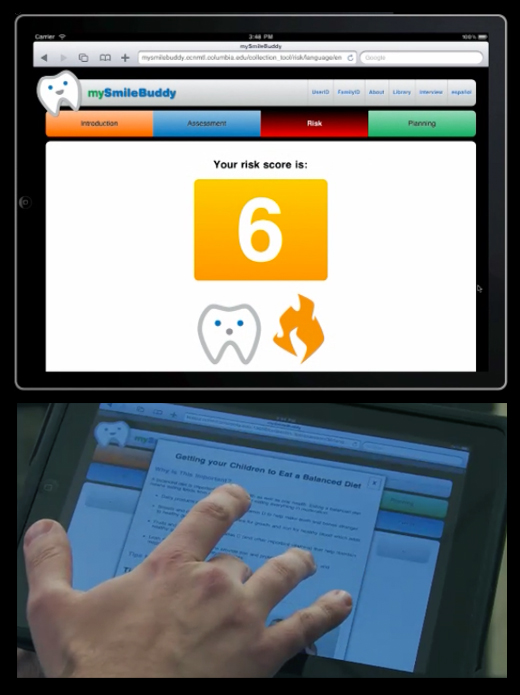
The goal of the pilot is to gather feedback from health workers and families about the design and content of MySmileBuddy as well as to collect data to refine the risk assessment rules behind the tool.
The development of this pilot is funded by the National Center on Minority Health and Health Disparities. Dr. Edelstein and CCNMTL hope to continue to develop MySmileBuddy into a robust assessment and educational tool that can be disseminated widely and are seeking funding via the public and private sectors.
(Updated July 11, 2011 to include related video.)
Register for the University Seminar, Triangle Initiative Interventions in HIV Prevention and Treatment: A Progress Report
January 31, 2011. Join us at the next University Seminar on New Media Teaching and Learning, "Triangle Initiative Interventions in HIV Prevention and Treatment: A Progress Report," on February 3, 2011, from 3:30 - 5:00pm in Butler Library.
In this seminar, Dr. Robert Remien of the HIV Center for Clinical and Behavioral Studies Dr. Louisa Gilbert of the Columbia School of Social Work's Social Intervention Group will share how they are implementing custom-developed, multimedia-powered interventions to support HIV treatment adherence and safer-sex behaviors both here in New York and in developing countries.
Increasingly, health practitioners are using technology-enabled interventions to promote positive life changes. During the past two years Dr. Remien and CCNMTL have been funded by the National Institute of Health to develop and pilot Masivukeni ("Let's Wake Up!" in Xhosa), an HIV treatment adherence intervention for lay counselors and patients in South Africa. Dr. Gilbert and CCNMTL partnered on the development and testing of a multimedia version of the WORTH intervention, an HIV prevention intervention designed for drug-involved women who are on probation or parole or enrolled in an alternative-to-incarceration program. Dr. Gilbert is the co-investigator on Multimedia WORTH, which is funded by the National Institute on Drug Abuse and under the direction of principal investigator Dr. Nabila El-Bassel of SIG. Masivukeni and Multimedia Worth are projects developed in the Triangle Initiative, CCNMTL's strategic effort to create digital tools and capacities that serve the intersecting interests of education, research, and the larger community.
Thursday, February 3, 2011
3:30PM - 5:00PM
523 Butler Library
Phone: (212) 854-9058
Register for the University Seminar
Masivukeni Featured in HIV Center E-Newsletter
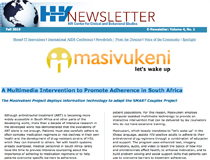 September 22, 2010. Masivukeni, the counselor support tool for delivering an HIV-treatment adherence intervention in clinics in South Africa, was recently featured in the Fall 2010 e-newsletter published by the HIV Center for Clinical and Behavioral Studies. The article, A Multimedia Intervention to Promote Adherence in South Africa, explains the research, development, and dissemination of Masivukeni, which is a joint project between CCNMTL and Dr. Robert Remien, a research scientist at the HIV Center for Clinical and Behavioral Studies and associate professor of clinical psychology.
September 22, 2010. Masivukeni, the counselor support tool for delivering an HIV-treatment adherence intervention in clinics in South Africa, was recently featured in the Fall 2010 e-newsletter published by the HIV Center for Clinical and Behavioral Studies. The article, A Multimedia Intervention to Promote Adherence in South Africa, explains the research, development, and dissemination of Masivukeni, which is a joint project between CCNMTL and Dr. Robert Remien, a research scientist at the HIV Center for Clinical and Behavioral Studies and associate professor of clinical psychology.
Masivukeni is a CCNMTL Triangle Initiative project. Read A Multimedia Intervention to Promote Adherence in South Africa or learn more about Masivukeni.
New York Law Journal Features New Collateral Consequences Calculator
 May 14, 2010. Collateral Consequences Calculator, the recently released web-based legal tool developed by CCNMTL and Columbia Law School, was featured on the front page of the New York Law Journal today. The article describes the Calculator, which is designed to provide an online overview of the complex collateral consequences associated with sections of the New York State Penal Law, and shares why Conrad Johnson, clinical professor of law and CCNMTL faculty partner, believes the tool will largely benefit the New York legal community: "There's simply too much to know, no one can accurately assess the consequences of a conviction in their head." Subscribers to the New York Law Journal can read the full article here.
May 14, 2010. Collateral Consequences Calculator, the recently released web-based legal tool developed by CCNMTL and Columbia Law School, was featured on the front page of the New York Law Journal today. The article describes the Calculator, which is designed to provide an online overview of the complex collateral consequences associated with sections of the New York State Penal Law, and shares why Conrad Johnson, clinical professor of law and CCNMTL faculty partner, believes the tool will largely benefit the New York legal community: "There's simply too much to know, no one can accurately assess the consequences of a conviction in their head." Subscribers to the New York Law Journal can read the full article here.
CCNMTL and Columbia Law School Launch Collateral Consequences Calculator
May 12, 2010. The Columbia Center for New Media Teaching and Learning (CCNMTL) and Columbia Law School announced the launch of the Collateral Consequences Calculator, a dynamic web-based tool that will help legal professionals in New York State identify the immigration and public housing consequences of criminal convictions. Judge Judith S. Kaye, former Chief Judge of New York State, considered these collateral consequences of criminal charges a significant social justice issue due to their potentially devastating effects on criminal defendants and their families.
Criminal defendants in New York State often plead guilty to crimes without being fully advised of the collateral consequences of those charges. These consequences can include deportation, inability to visit the United States, or ineligibility for public housing. Because collateral consequences touch on so many areas of law, even the most highly skilled defense attorneys, prosecutors, and judges may not possess the requisite knowledge to fully understand the repercussions of criminal charges.
The Calculator will provide legal practitioners and judges with an unprecedented at-a-glance overview of the immigration and public housing eligibility consequences that attach to a plea offer or criminal conviction. A number of other audiences will also benefit from the Calculator; legal academics can build case studies around it, judges can assure appropriate sentencing, and public policy researchers can use it as a lens through which to examine the real-world impact of abstract policy choices.
Conrad Johnson, clinical professor of law and co-founder of the Lawyering in the Digital Age Clinic at the Law School, partnered with CCNMTL in 2007 to design a system that could mitigate the knowledge gap surrounding collateral consequences in New York State. Over the past three years, law students, legal experts, and educational technologists at CCNMTL developed the Calculator, which allows users to select offenses in the New York State penal law and receive an immediate online overview of which consequences would be certain, probable, or possible as a result of conviction. Users can also use the Calculator to compare specified consequences to another offense. “The Calculator can serve as a valuable starting point in analyzing the immigration and public housing eligibility consequences of a conviction,” said Johnson.
CCNMTL’s developers custom-built the Calculator by modeling the relationship between offenses and consequences. The unique system enables Johnson and his team to specify the relevant connections between elements of the model, and then displays these results in a concise, intelligible way. CCNMTL plans to make the templates and programming code from the Calculator available to nonprofit and government organizations outside of New York, allowing others to create state-specific Calculators.
“The Collateral Consequences Calculator has the capacity to make lawyers, judges and defendants more aware of the indirect repercussions of their actions and decisions in the lives of defendants and their families,” said Frank Moretti, CCNMTL executive director.
The Collateral Consequences Calculator was developed within CCNMTL's Triangle Initiative, which creates digital tools and capacities that simultaneously serve the intersecting interests of education, research, and the larger community. View the Calculator at http://calculator.law.columbia.edu.
Related links: Download the press release (PDF)
Download the press release (PDF)
Health Facilitators Trained to Use New Multimedia WORTH Intervention
November 4, 2009. CCNMTL and the Social Intervention Group (SIG) at the Columbia School of Social Work trained health facilitators in New York City last week to use a multimedia HIV prevention program designed for drug-involved women who are on probation or parole. The program, Multimedia WORTH (Women On The Road To Health), was developed by CCNMTL and SIG faculty partner Professor Nabila El-Bassel and is funded by the National Institute of Drug Abuse (NIDA).
Multimedia WORTH delivers interactive activities, such as quizzes, games, and motivational videos, that teach participants pertinent HIV prevention behaviors—communication and negotiation skills, health care and maintenance, and feelings of self worth and empowerment. In addition to educational activities, Multimedia WORTH offers online customized journals for participants and supervisory reports for facilitators. The program is delivered on laptop computers used by participants in both individual and facilitator-supported group sessions.
CCNMTL and SIG created Multimedia WORTH as part of a research project to evaluate the efficacy of a multimedia-supported intervention versus a traditional paper-based intervention. A randomized trial conducted in November will test the ability of Multimedia WORTH to increase condom use, decrease the incidence of sexually transmitted infections (STIs), and reduce substance use among 432 drug involved female offenders in an Alternative-to-Incarceration (ATI) program in New York City.
In preparation for the trial, CCNMTL developers trained Multimedia WORTH facilitators who will deliver the program to groups of six to eight women over a span of 18 weeks. Once the trial is completed, CCNMTL and SIG will analyze and publish their findings, and elements of Multimedia WORTH will be used to train Columbia social work students preparing for careers in the criminal justice system.
Multimedia WORTH builds on CCNMTL’s work with HIV-related behavior change interventions, following the lead of Multimedia Connect and SMART+SA. The program will help CCNMTL and SIG understand how technology-mediated interventions can improve a participant’s ability to achieve the desired behavior changes.
Masivukeni Pilot Underway in South Africa
July 8, 2009. After more than a year of development, CCNMTL and partners from the HIV Center for Clinical and Behavioral Studies and the University of Cape Town have begun collecting data from the pilot launch of Masivukeni, a multimedia HIV treatment and care adherence intervention, implemented at the Hout Bay clinic outside Cape Town, South Africa.
Masivukeni is a computer-based intervention used by non-professional peer counselors in South Africa to help HIV-positive adults improve adherence to treatment by enlisting the support of a "treatment buddy" (e.g., a partner, friend, or family member), so that together they can understand the importance of taking their medication and maintaining high levels of overall treatment adherence. The intervention features enhanced text, imagery, animations, audio, and video and is designed to incorporated culturally relevant South African themes. Masivukeni is funded by a grant from the National Institute of Mental Health (NIMH) and is based on the proven dyadic-focused adherence program, "SMART Couples," developed by Dr. Robert H. Remien and his colleagues at the HIV Center.
During the Masivukeni pilot test, counselors at the Hout Bay clinic are delivering the intervention to 30 HIV-positive patients and the local standard of care to another 30 HIV-positive patients. All patients have been screened, assessed, and randomized by the counselors, and will participate in the test until March 2010. Following its completion, the project team from CCNMTL and the HIV Center will evaluate data collected by the counselors and apply for more funding in effort to continue testing Masivukeni and distribute the intervention more broadly.
Related links: Read more about Masivukeni
Read more about Masivukeni
CCNMTL Partners with Social Work Faculty on $3.3 Million Grant
October 20, 2008. A $3.3 million, five-year grant was awarded to Dr. Nabila El-Bassel of the Columbia University School of Social Work by the National Institute on Drug Abuse to study the efficacy of a multimedia HIV prevention program to be developed with the Columbia Center for New Media Teaching and Learning (CCNMTL).
CCNMTL will work closely with Dr. El-Bassel and the Social Intervention Group (SIG) research team to create Multimedia WORTH (Women on the Road to Health), an online, interactive version of a drug use and HIV/STI prevention intervention that has proven effective for female offenders in a large Alternative-to-Incarceration Probation Program in New York City. Recent studies have found that female offenders under community supervision test HIV positive at rates that are four times higher than the general population.
“There is an urgent need to identify and scale up evidence-based HIV prevention interventions for drug-involved women on probation,” said Dr. El-Bassel. “Our hypothesis is that use of multimedia will result in superior outcomes.”
Multimedia modules developed for the intervention – including video models and interactive tools – will also be used in Columbia courses to help social work and public health students, and other human service professions develop the skills needed in these fields. SIG researchers hypothesize that multimedia will result in better facilitator delivery of the four-session, gender-specific intervention and will generate a better response to the intervention by study participants.
“Putting technology to work in the service of improving the human condition is at the heart of CCNMTL’s Triangle Initiative,” said Frank Moretti, executive director of CCNMTL. “We look forward to working with SIG on extending the knowledge, and eventually the reach, of multimedia-driven health interventions through research and education.”
Related links: Download the press release (PDF)
Download the press release (PDF)
South Africa Trip Informs Drug Adherence Project
March 31, 2008. CCNMTL staff accompanied Dr. Robert Remien, research scientist at the HIV Center for Clinical and Behavioral Studies, on a fact-finding mission to Cape Town, South Africa as part of an NIMH-supported project on HIV-treatment adherence known as SMART +SA. The team examined cultural issues and practices around patient care in a variety of clinical settings while focusing on the viability of enhancing existing protocols with multimedia. The highlights of the trip were the meaningful, in-depth conversations with counselors, nurses, and patients, all of whom demonstrated extraordinary commitment, patience, and perseverance in the face of limited resources, the legacy of a troubled history, and continued stigma and other cultural and political barriers. The project staff has initiated work, informed by the visit, on tools and online activities for adherence counselors to use in one-on-one conversations with their patients.
Related links: Learn more about the Masivukeni project
Learn more about the Masivukeni project
Press Release: NIMH Grant for Multimedia Connect
July 30, 2007. The Columbia University School of Social Work's Social Intervention Group (SIG) and the Columbia Center for New Media Teaching and Learning (CCNMTL) announced the receipt of a $3.5 million, five-year research grant award from the National Institute of Mental Health (NIMH). The goal of the collaborative project is to evaluate the outcomes of using multimedia and web-based technology to disseminate an HIV-prevention program.
Related links: Download the press release (PDF)
Download the press release (PDF)
 Download the informational page (PDF)
Download the informational page (PDF)
Chief Judge Kaye Supports Collateral Consequences Site
March 20, 2007. Judith S. Kaye, chief judge of the State of New York, recognized the Collateral Consequences Calculator as a "fabulous online resource" and a "groundbreaking initiative" in her 2007 annual address, "The State of the Judiciary." Produced in collaboration with Professor Conrad Johnson's Lawyering in the Digital Age Clinic at the Columbia Law School, the Collateral Consequences Calculator allows one to compare the collateral consequences of New York State criminal charges across of variety of doctrinal areas. It will serve multiple communities in a variety of ways: faculty can build case studies around it, lawyers can use it to help them better counsel their clients, judges can use it to help assure appropriate sentencing, and public policy researchers can use it as a lens to examine the matrix of the New York State legal system.


